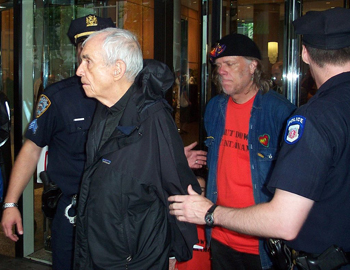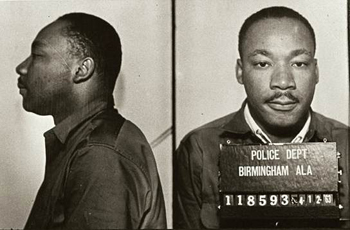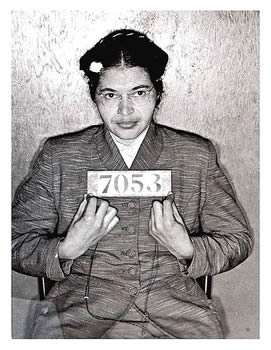For Sunday August 27, 2017
Lectionary Readings (Revised Common Lectionary, Year A)
Exodus 1:8–2:10 or Isaiah 51:1–6
Psalm 124 or Psalm 138
Romans 12:1–8
Matthew 16:13–20
"Do not be conformed to this age," Paul tells the believers in Rome. Instead, "be conformed to the image of God's son." (12:1, 8:29). God thus calls us to say No to the many death-dealing ways of our world, and a counter-cultural Yes to the life-giving good news of Jesus.
Martin Luther King summarized Romans 12:1-2 in one of his sermons — he called it "transformed non-conformity."
Last week I re-read a book called Daniel Berrigan: Essential Writings (2009). Since I read and review a book every week for JwJ, I virtually never re-read books. But Berrigan is an exception. An inspiration. A clarifier. After I finished the book, I joked to a friend that I needed an emoticon of an exploding head.
Across his long life as a Jesuit priest, poet, and peace activist, Berrigan (1921–2016) protested the many manifestations of our culture of death and violence. He lamented the assimilation of the church to the world. When Nora Gallagher asked Berrigan how many times he had been jailed for the gospel, he lamented, "not enough."
 |
|
Daniel Berrigan in 2006.
|
All his non-conformity on the edges of society, though, had a specific orientation — in Paul's language, conformity to the image of God's son. When asked by judges and prosecutors to explain the rationale for his illegal actions, Berrigan was adamant — his No to our culture of death made no sense at all except when understood as a Yes to the life, death, and resurrection of Jesus.
When the Jesuit priest John Dear asked him for some advice, Berrigan responded: "Make your story fit into the story of Jesus. Ask yourself: does your life make sense in light of the life of Jesus? All we have to do is close our eyes to the culture and open them to our friends. We have enough to go on. We can't afford the luxury of despair." Stand somewhere, said Berrigan. Do the Word. Put your body where your words are.
Berrigan commends other well-known Transformed Non-Conformists, like Dorothy Day, Thomas Merton, Nelson Mandela, and Martin Luther King. There's a "great cloud of witnesses" out there who have shown us the way. But it's precisely at this point that Berrigan loses a little traction for me. After all, my little life will never win a Nobel Peace Prize or land me on the FBI's Ten Most Wanted List.
So, thank God for the story this week about the mid-wives Shiphrah and Puah, two ordinary women who performed extraordinary acts of faith. When a new pharaoh arose "who knew not Joseph," Israel's bondage in Egypt took an violent turn — forced slave labor, ruthless oppression, and the edict of infanticide: "Every boy that is born you must throw into the river, but let every girl live."
Shiphrah and Puah defied the genocidal command. Why? Because “they feared God” rather than Pharaoh (Exodus 1:17). When asked about their disobedience, they lied about what they were doing. And then, just like that, these two women disappear from the Biblical narrative, never to be mentioned again. It's been suggested that their No to Pharoah and Yes to God "may be the first known incident of civil disobedience in history." (Klagsbrun).
 |
|
Martin Luther King, arrested in Birmingham.
|
The Hebrew mid-wives remind me of another ordinary woman whose No to death and Yes to life reverberated down through history.
On December 1, 1955, after working all day as a seamstress at a department store, Rosa Parks boarded a bus to go home. She paid her fare and sat down in the first row of seats that were reserved for blacks. When the front of the bus reserved for white people filled up, the bus driver moved the "colored" sign behind Parks, then told her and three other blacks to move to the back to accommodate the white passengers. Her three seat mates moved; Rosa Parks did not.
"When that white driver stepped back toward us," she later recalled, "when he waved his hand and ordered us up and out of our seats, I felt a determination cover my body like a quilt on a winter night."
"When he saw me still sitting, he asked if I was going to stand up, and I said, 'No, I'm not.' And he said, 'Well, if you don't stand up, I'm going to have to call the police and have you arrested.' I said, 'You may do that.'"
The bus driver called the police, who arrested Parks for violating Montgomery's segregation laws. She was also fired from her job. But her quiet act of civil disobedience jump started the Montgomery Bus Boycott three days later on December 4. The non-violent protest lasted 381 days, until the Supreme Court ruled in Browder v. Gayle (1956) that bus segregation was illegal.
 |
|
Rosa Parks booking photo after her arrest.
|
Like Berrigan and King, Rosa Parks' political activism and civil disobedience were rooted in the gospel. In her biography The Rebellious Life of Mrs. Rosa Parks (2013), Jean Theoharis describes Parks as "a staunch and active Christian." She always carried her Bible with her, and was a lifelong member of the African Methodist Episcopal Church. "That's sort of in my family background, too," said Parks, "the Lord's power within me to do what I have done."
She led a life of "rich and active worship" in both Montgomery and Detroit (where she was a deaconess). Her Christian faith nourished her beliefs in human dignity, equality, the long struggle against racism, and the "Christian responsibility to act." She responded to death threats with a prolonged period of prayer in church, after which, writes Theoharis, "an intense calm swept over her."
"From my upbringing and the Bible," Parks wrote in her autobiography, My Story, "I learned people should stand up for rights just as the children of Israel stood up to the Pharaoh."
After I finished re-reading Berrigan's "essential writings," I circled back to another of his books, a collection of poetry called And The Risen Bread: Selected Poems, 1957–1997, and in particular one of his Georgetown Poems (5):
The suburbs are sad as death
the university slumps on its arse
money dreaming of money.
Washington DC, a whitewashed sepulchre
awaits the diggers of history
side by side, tombs, slums, imperial empathy.Amid all this
the transfixed tourists
the international pimps
the wheelers and dealers
rolling along like chariot wheels of fate
the faces like faces on dollars—amid all this
did one original mind
cry out a gospel versepanic in the streets!
tumbling whirlwinds!
the unbearable halo
of resurrected Christ!
So, confirm the gospel. Don't conform to the world. Say No to all the demons of death. Say Yes to the life of God in Christ.
Image credits: (1) Wikipedia.org; (2) Wikipedia.org; and (3) Wikipedia.org.





